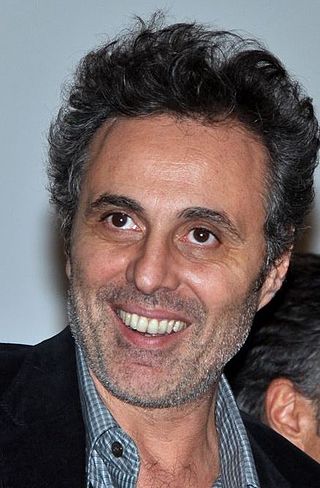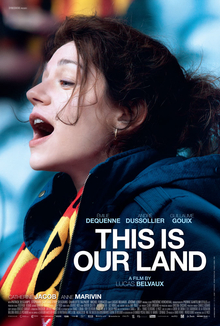Plot
Sébastien Chantoux, (Lucas Belvaux), a psychoanalyst, leaves Paris and goes to live in the Creuse, at Royère-de-Vassivière. Hardly settled, he discovers "Troc'En Creuse", a system of local exchange that operates through the use of barter. Initially reticent about using it and bartering his psychoanalytic sessions, he is reconciled to the system, and in a few weeks becomes a figure in the community. Everything seems to be working out, and without costing Sébastien a sou, until the arrival of Mlle. Oudinot, (Catherine Mouchet), a tax inspector. War is declared; "Troc'En Creuse" and the small local economy against the capitalism of the state.

Louis-Sébastien Mercier was a French dramatist and writer, whose 1771 novel L'An 2440 is an example of proto-science fiction.

Médée is a tragédie mise en musique in five acts and a prologue by Marc-Antoine Charpentier to a French libretto by Thomas Corneille. It was premiered at the Théâtre du Palais-Royal in Paris on December 4, 1693. Médée is the only opera Charpentier wrote for the Académie Royale de Musique. The opera was well reviewed by contemporary critics and commentators, including Sébastien de Brossard and Évrard Titon du Tillet, as well as Louis XIV whose brother attended several performances, as did his son; however, the opera only ran until March 15, 1694, although it was later revived at Lille.
The 11th César Awards ceremony, presented by the Académie des Arts et Techniques du Cinéma, honoured the best French films of 1985 and took place on 22 February 1986 at the Palais des Congrès in Paris. The ceremony was chaired by Madeleine Renaud and Jean-Louis Barrault and hosted by Michel Drucker. Three Men and a Cradle won the award for Best Film.

Catherine Jacob is a French film and theatrical actress who has won a César Award for her role in Life Is a Long Quiet River (1988), and was nominated for Best Supporting Actress in Tatie Danielle (1990), Merci la vie (1991) and Neuf mois (1994). She has been two-time president of the Lumières Award. She is known for her voice and her charisma.

Catherine Mouchet is a French actress.

The Pornographer is a 2001 erotic drama film written and directed by Bertrand Bonello, who co-wrote the music score with Laurie Markovitch. The film features an explicit sex scene with two pornographic actors, Ovidie and Titof. It won the FIPRESCI Prize at the 2001 Cannes Film Festival and was nominated for the Bronze Horse at the Stockholm Film Festival.

Éric Caravaca is a French actor, film director and screenwriter.

A Crime in Paradise is a 2001 French comedy film directed by Jean Becker, adapted by Sebastien Japrisot from the story by Sacha Guitry, and starring Jacques Villeret and Josiane Balasko. The scenario was used on the film La Poison (1951).

Gilbert Melki is a French actor.
Leçons de ténèbres is a genre of French Baroque music which developed from the polyphonic lamentations settings for the tenebrae service of Renaissance composers such as Sermisy, Gesualdo, Brumel, Tallis, and Tomás Luis de Victoria into virtuoso solo chamber music.

The 3rd Magritte Awards ceremony, presented by the Académie André Delvaux, honored the best films of 2012 in Belgium and took place on February 2, 2013, at the Square in the historic site of Mont des Arts, Brussels beginning at 8:00 p.m. CET. During the ceremony, the Académie André Delvaux presented Magritte Awards in 20 categories. The ceremony was televised in Belgium by BeTV. Actress Yolande Moreau presided the ceremony, while actor Fabrizio Rongione hosted the show for the first time.
Events from the year 1653 in France.

This Is Our Land is a 2017 French-Belgian drama film directed by Lucas Belvaux and starring Émilie Dequenne, André Dussollier and Guillaume Gouix. It received seven nominations at the 8th Magritte Awards, including Best Film and Best Director for Belvaux, and won Best Actress for Dequenne.

Counter Investigation is a 2007 French crime film directed by Franck Mancuso that came out in 2007, with Jean Dujardin in the leading role. From a story by Lawrence Block, it is about a policeman whose young daughter is raped and murdered.
Philippe Vilain is a French man of letters, writer, essayist, doctor of modern literature of the University of Paris III: Sorbonne Nouvelle.

The Treaty of La Jaunaye was a peace accord for the War in the Vendée, signed by François de Charette and Charles Sapinaud de La Rairie, on behalf of the leaders of the Catholic and Royal Army, and by Albert Ruelle on behalf of the National Convention on 17 February 1795 at the manor of La Jaunaye, at Saint-Sébastien-sur-Loire, near Nantes. The treaty brought an end to major hostilities. The Vendée counter-revolutionaries and chouans recognised the French Republic and in return received assurances on freedom of religion, the abolition of conscription and the right to arm a militia.
Gregoire Moulin vs. Humanity is a 2001 French comedy film directed by Artus de Penguern.
Marc Duval or Du Val was a French court painter and printmaker, most notable for his portraits of leaders of the Huguenot faction and as the probable painter of works previously attributed to the "Master of the Portrait of Sébastien de Luxembourg, Viscount of Martigues". For a time he was considered one of France's best draughtsmen and engravers. He worked at the court of the last kings of the Valois dynasty and produced highly-valued portraits of them and other nobility in Paris, dying in that city on 13 September 1581, a date he had himself predicted. He was married to Catherine, though her maiden name is unknown, and their daughter remained in Paris and was a talented artist.
This page is based on this
Wikipedia article Text is available under the
CC BY-SA 4.0 license; additional terms may apply.
Images, videos and audio are available under their respective licenses.











